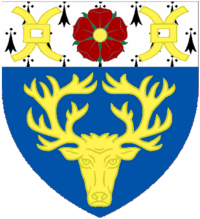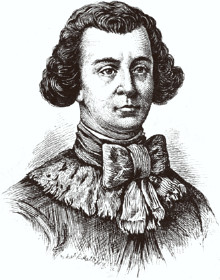Barons Amulree (1929)
- William Warrender Mackenzie, 1st Baron Amulree (1860–1942)
- Basil William Sholto Mackenzie, 2nd Baron Amulree (1900–1983)
  |
|
Baron Amulree, of Strathbraan in the County of Perth, was a title in the Peerage of the United Kingdom. It was created on 22 July 1929 for the lawyer and Labour politician Sir William Mackenzie. He was Secretary of State for Air between 1930 and 1931. He was succeeded by his son, a physician. The second Lord Amulree was unmarried and the title became extinct on his death on 15 December 1983.
  |
|

Earl of Craven, in the County of York, is a title that has been created twice, once in the Peerage of England and once in the Peerage of the United Kingdom.

Earl of Limerick is a title that has been created twice in the Peerage of Ireland, associated first with the Dongan family, then with the Pery family.

Earl of Wharncliffe, in the West Riding of the County of York, is a title in the Peerage of the United Kingdom.
Viscount Camrose, of Hackwood Park in the County of Hampshire, is a title in the Peerage of the United Kingdom. It was created on 20 January 1941 for the prominent newspaper magnate William Berry, 1st Baron Camrose. He had already been created a Baronet, of Long Cross in the County of Surrey, in the Baronetage of the United Kingdom, on 4 July 1921, and Baron Camrose, of Long Cross in the County of Surrey, on 19 June 1929, also in the Peerage of the United Kingdom. His second son, the third Viscount, disclaimed the peerages in 1995 on succeeding his elder brother. However, he had already been created a life peer as Baron Hartwell, of Peterborough Court in the City of London, on 19 January 1968. On his death in 2001 the life peerage became extinct while he was succeeded in the other titles by his eldest son, the fourth Viscount. The first three Viscounts all headed The Daily Telegraph at one point, the first having purchased it from Harry Levy-Lawson, 1st Viscount Burnham, but in the 1980s they lost control to Conrad Black.

Baron Harris, of Seringapatam and Mysore in the East Indies and of Belmont in the County of Kent, is a title in the Peerage of the United Kingdom.
Baron Dulverton, of Batsford in the County of Gloucester, is a title in the Peerage of the United Kingdom. It was created in 1929 for the businessman Sir Gilbert Wills, 2nd Baronet. He was President of the Imperial Tobacco Company and also sat as a Conservative Member of Parliament for Taunton and Weston-super-Mare. The Wills Baronetcy, of Manor Heath in the Parish of Bournemouth in the County of Southampton, was created in 1897 for his father Frederick Wills. He was a director of W. D. & H. O. Wills, which later merged into the Imperial Tobacco Company, and also represented Bristol North in Parliament as a Liberal Unionist. A member of the wealthy Bristol tobacco importing Wills family, he was the younger brother of Sir Edward Payson Wills, 1st Baronet, a half brother of Sir Frank William Wills Kt., and the cousin of William Wills, 1st Baron Winterstoke. In 1966 the Wills family contained the largest number of millionaires in the British Isles, with 14 members leaving fortunes in excess of one million pounds since 1910, totalling £55 million. As of 2014 the titles are held by the first Baron's grandson, the third Baron, who succeeded his father in 1992.

Baron Avebury, of Avebury in the County of Wiltshire, is a title in the Peerage of the United Kingdom. It was created 22 January 1900 for the banker, politician and archaeologist Sir John Lubbock, 4th Baronet. He was succeeded by his eldest son, the second Baron. On his death the titles passed to his nephew, the third Baron. He was the son of Hon. Harold Fox Pitt Lubbock, fourth son of the first Baron, who died in 1971. The title then passed to the third Baron's first cousin, the fourth Baron, the son of Hon. Maurice Fox Pitt Lubbock, sixth son of the first Baron. The fourth baron was a Liberal Democrat politician and one of the ninety excepted hereditary peers who remained in the House of Lords after the passing of the House of Lords Act 1999. He was succeeded by his son, the fifth Baron, in 2016.

Baron Alvingham, of Woodfold in the County Palatine of Lancaster, is a title in the Peerage of the United Kingdom. It was created on 10 July 1929 for Robert Yerburgh. He had previously represented Dorset South in the House of Commons as a Conservative. His father, Robert Yerburgh, had earlier represented Chester in Parliament. In 1916, Royal approval was given to a peerage to whom he had been signified, but he died before the patent was issued. The first Baron's son, the second Baron, who succeeded his father in 1955, served in the Coldstream Guards and retired in 1981 as a Major-General and Director of Army Quartering. As of 2020 the title is held by his son, the third Baron, who succeeded his father in that year.
Baron Westwood, of Gosforth in the County of Northumberland, is a title in the Peerage of the United Kingdom. It was created in 1944 for the trade unionist William Westwood. He was General Secretary of the Ship Constructors' and Shipwrights' Association from 1929 to 1945. As of 2019 the title is held by his great-grandson, the fourth Baron, who succeeded his father in that year.
Baron Vestey, of Kingswood in the County of Surrey, is a title in the Peerage of the United Kingdom. It was created in 1922 for the shipping magnate Sir William Vestey, 1st Baronet. He was the co-founder of the Blue Star Line. Vestey had already been created a baronet, of Bessémer House in the Metropolitan Borough of Camberwell, in 1913. As of 2018, the titles are held by his great-grandson, the third Baron, who succeeded his grandfather in 1954. He is the eldest son of the Hon. William Vestey, only son of the second Baron. Lord Vestey served as Master of the Horse from 1999 to 2018.
Baron Broadbridge, of Brighton in the County of Sussex, is a title in the Peerage of the United Kingdom. It was created in 1945 for the Conservative politician Sir George Broadbridge, 1st Baronet. He had already been created a Baronet, of Wargrave Place in the County of Berkshire, on 22 November 1937. The title descended from father to son until the death of his grandson, the third Baron, in 2000, he late Baron was succeeded by his first cousin, the fourth holder of the titles. He was the son of the Hon. Hugh Trevor Broadbridge, third son of the first Baron. He was in turn succeeded by his only son, a retired air vice-marshal who was honorary surgeon to the Queen, in 2020.
Baron Birkett, of Ulverston in the County Palatine of Lancaster, is a hereditary title in the Peerage of the United Kingdom. It was created on 31 January 1958 for the prominent lawyer Sir Norman Birkett. He was one of the British judges at the Nuremberg Trials who later served as a Lord Justice of Appeal before becoming a Law Lord.
Baron Crawshaw, of Crawshaw in the County Palatine of Lancaster and of Whatton in the County of Leicester is a title in the Peerage of the United Kingdom. It was created on 25 August 1892 for Sir Thomas Brooks, 1st Baronet. He notably served as High Sheriff of Lancashire in 1884. Brooks had already been created a baronet in the Baronetage of the United Kingdom, of Crawshaw Hall and Whatton House, on 9 February 1891. As of 2013 the titles are held by his great-grandson, the fifth Baron, who succeeded his elder brother in 1997.
Baron Rathcavan, of The Braid in the County of Antrim, is a title in the Peerage of the United Kingdom. It was created on 11 February 1953 for the Unionist politician Sir Hugh O'Neill, 1st Baronet. He had already been created a Baronet, of Cleggan in the County of Antrim, on 17 June 1929. O'Neill was the third son of Edward O'Neill, 2nd Baron O'Neill and the uncle of the Prime Minister of Northern Ireland Terence O'Neill, Baron O'Neill of the Maine. Lord Rathcavan was also a male-line descendant of Edward Chichester, 1st Viscount Chichester. He was succeeded by his eldest surviving son, the second Baron. He succeeded his father as Unionist Member of Parliament for Antrim in 1952, a seat he held until 1959, and was later a member of the Parliament of Northern Ireland. As of 2014 the titles are held by his son, the third Baron, who succeeded in 1994.

William Warrender Mackenzie, 1st Baron Amulree,, known as Sir William Mackenzie between 1918 and 1929, was a British barrister, public servant and Labour politician. He served as Secretary of State for Air under Ramsay MacDonald between 1930 and 1931.
Earl of Seaforth was a title in the Peerage of Scotland and the Peerage of Ireland. It was held by the family of Mackenzie from 1623 to 1716, and again from 1771 to 1781.
James Alexander Stewart-Mackenzie, was a Scottish politician and British colonial administrator.

Kenneth Augustus Muir Mackenzie, 1st Baron Muir Mackenzie, was a British barrister, civil servant, and Labour politician.

Basil Mackenzie, 2nd Baron Amulree was a British physician and leading advocate of geriatric medicine in the United Kingdom.
Amulree may refer to: